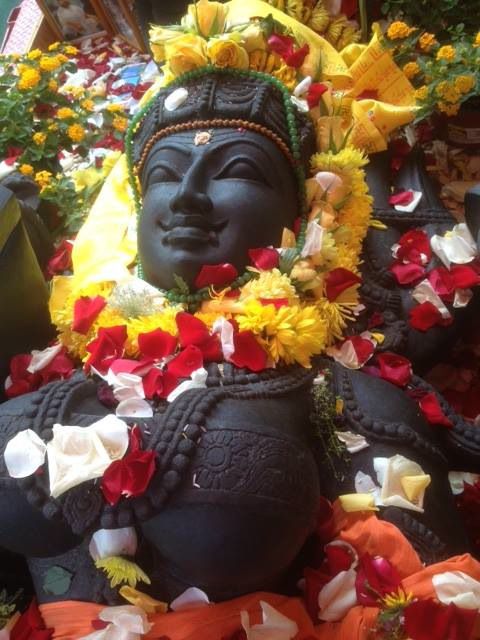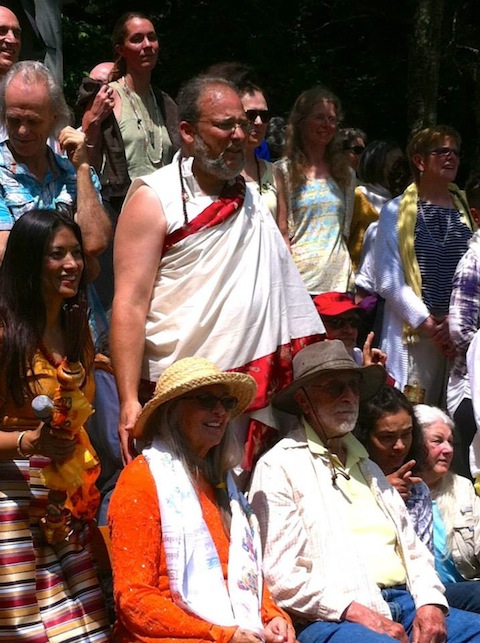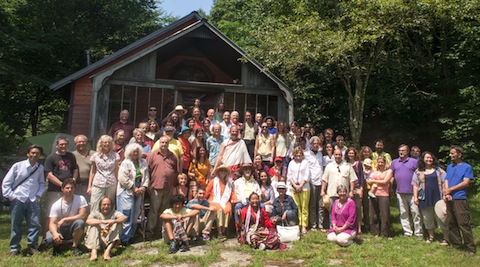
A ten-foot-tall, 10,000-pound statue of a Hindu rain goddess arrived in Big Indian on Sunday celebrate the reopening of a long-dormant Catskills ashram.
The Poughquag-based Bodhivastu Foundation is planning to open a Buddhist spiritual retreat center at the site of an ashram founded by legendary Catskills guru Swami Rudrananda -- known as Rudi -- in 1968.
John Mann, the owner of the parcel located at 126 Lost Clove Road in the Ulster County town of Shandaken, donated it to the foundation, according to Lama Rangbar Nyimai Özer, the spiritual leader of the Bodhivastu Foundation.
According to Ulster County real estate records, the property was sold on February 25.
"We explained our intention to him about making [it] a spiritual sanctuary retreat and healing center," said Lama Rangbar, who is also known as Adam Friedensohn. "It was very much in line with Rudi's original intention."
Below: Lama Rangbar, standing, with his wife Sapana Shakya, left, at the dedication ceremony. Seated in front are John Mann and his wife Cappella, the former owners of the property.

On Sunday, the group dedicated the retreat center by installing a statue of the Hindu Goddess Mariamma, which was donated for the location by Sai Maa, a Hindu guru with her own international following.
Over 100 people from three different spiritual communities attended the dedication ceremony, Lama Rangbar said, including many devotees of Rudi.
Below: Attendees at the dedication ceremony on Sunday, July 27.

"It was a catalyst for the old Rudi community to assemble back again and to take stock in the value of that place," he said. "This is a rebirth of something that is an icon of the region that is getting a whole revamp."
Rudi was born in Brooklyn as Albert Rudolph. In the 1960s, he developed an eclectic set of spiritual practices in a Greenwich Village storefront that grew into a spiritual movement with an international reach.
In 1968, Rudi founded the ashram in Big Indian. He died in 1973, but his ashram remained active through the 1990s. It has been largely dormant for over a decade, Rangbar said.
Rudi's follower John Mann bought the property in 1979, according to a website about Rudi and the ashram, and has owned it ever since. Now in his 80s, Mann has been looking to pass on the property.
The site houses the former hotel, which was used as a meditation hall, as well as a 50-foot stupa and a shrine, both of which house large statues of Rudi.
The shrines are not part of the sale. They and the land they are on are still owned by Mann, who plans to maintain them as sanctuaries for the followers of Rudi "in perpetuity," Rangbar said.
The statue of Mariamma has its own long history. It was commissioned by a follower of Sai Maa, a Hindu guru based in Colorado, who had a vision of the goddess offering blessings to America. It was carved in India ten years ago, but Sai Maa decided to donate it to the Bodhivastu Foundation earlier this year, according to a press release.
"She's a goddess to be reckoned with, you could say," said Lama Rangbar. "All 10,000 pounds and ten feet of her are astounding."
Mariamma is a South Indian goddess of rain, prosperity, fertility, and health.
Lama Rangbar said that the property is open to the public, and that anyone is invited to visit the statue, which is currently horizontally mounted on a truck bed, covered with flower garlands.
"She's sitting there laying down deciding when she's going to get out of bed," he said. "The deity has a tarp covering her, but people are allowed to take a peek."
For more infomation about the new retreat center, contact info@bodhivastu.org, sapana@bodhivastu.org, or call 845-254-4455.
Below: Footage of the ashram in 1970, from "The Rudi Movie."










